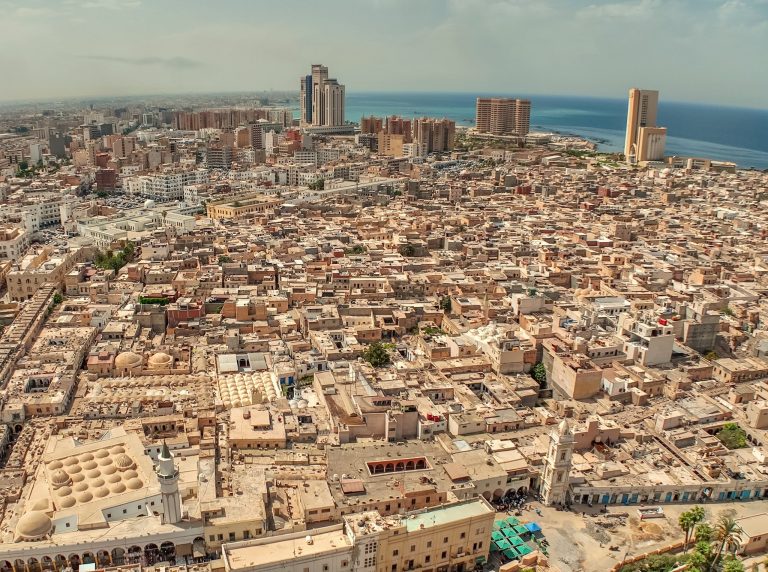At Qabas, we understand the unique landscape of public relations in Libya. Our expertise allows us to navigate the complexities of the Libyan market, delivering tailored strategies that resonate with our clients’ audiences. As the leading PR firm in Libya, we’re committed to setting industry benchmarks through innovative solutions and excellence in service.
We pride ourselves on being a Libya-based service provider, deeply rooted in the local culture and business environment. Our team leverages their in-depth knowledge to craft compelling narratives and build strong reputations for our clients. With a focus on strategic communication, we ensure that your message stands out and achieves its intended impact.
Table of Contents
![#1 Public Relations in Libya | Est 1994 [FREE Consultation] 1 #1 Public Relations in Libya Est 1994 [FREE Consultation]](https://qbs.ly/wp-content/uploads/2024/12/1-Public-Relations-in-Libya-Est-1994-FREE-Consultation-1024x683.jpg)
Overview Of Public Relations In Libya
Public relations in Libya has evolved significantly, reflecting the country’s dynamic political and social environment. As a Libya-based service provider, we recognise the unique challenges and opportunities within the local market. Our expertise stems from a deep understanding of Libyan culture and business practices, enabling us to craft effective communication strategies tailored to our clients’ needs.
Since the 1990s, when modern PR education was introduced at the University of Benghazi, the field has expanded despite facing obstacles such as limited planning and training. The post-Gaddafi era further transformed the PR landscape, necessitating adaptive strategies to address emerging media channels and shifting public sentiments. We have consistently maintained an ethical stance, ensuring transparency and integrity in all our communications.
Our services encompass media relations, corporate communications, crisis management, and event planning. By leveraging our comprehensive knowledge of the Libyan market, we deliver results that enhance our clients’ reputations and foster meaningful engagement with their target audiences. Our trusted reputation is built on delivering reliable and impactful PR solutions that align with the evolving needs of Libya’s diverse sectors.
Historical Context
Public relations in Libya has evolved alongside the nation’s political and social transformations. Our deep understanding of this progression underpins our strategic approach to PR.
Development Of PR Practices
Public relations in Libya originate from the early Islamic period around 643 AD, where persuasion was employed to propagate Islam, establishing foundational communication between leaders and the populace.[^3] During Italian colonial rule (1911-1943) and the British Mandate (1943-1951), PR practices remained limited due to restrictive media environments.[^1][^4] Following Libya’s independence in 1951, the media landscape expanded, laying the groundwork for modern PR. The 1990s marked the introduction of formal PR education, fostering the growth of professional practices despite challenges such as limited infrastructure and training resources. The post-Gaddafi era accelerated the need for adaptive PR strategies to navigate new media channels and shifting public sentiments, reinforcing the importance of ethical and transparent communication.
| Year | Milestone |
|---|---|
| 643 AD | Early use of persuasive communication during the Islamic period |
| 1911-1943 | Italian colonial rule with limited PR development |
| 1943-1951 | British Mandate period, constrained PR activities |
| 1951 | Libyan independence and expansion of the media landscape |
| 1990s | Introduction of modern PR education in Libya |
| 2011 | Post-Gaddafi era initiating adaptive and strategic PR practices |
![#1 Public Relations in Libya | Est 1994 [FREE Consultation] 2 Libya Corporate Visa, All You Need to Know Free 30-Minute Consultation](https://qbs.ly/wp-content/uploads/2024/12/Libya-Corporate-Visa-All-You-Need-to-Know-Free-30-Minute-Consultation-1024x575.jpg)
Current Trends And Practices
Public relations in Libya continues to evolve, adapting to the dynamic socio-political environment and technological advancements.
Digital PR Strategies
Digital platforms dominate Libya’s PR landscape. We utilise social media channels such as Facebook, Instagram, and TikTok to engage audiences effectively. With internet penetration reaching over 50% and smartphone usage exceeding 60% as of 2023, these platforms offer significant reach. Our strategies include content creation, community management, and targeted campaigns to build brand communities and disseminate information efficiently. Additionally, we implement data-driven approaches to measure engagement and optimize performance, ensuring our clients achieve maximum impact.
Media Landscape
Libya’s media landscape is diverse, encompassing traditional outlets and emerging digital media. Traditional media, including newspapers, radio, and television, remain influential, particularly in rural areas where internet access is limited. However, urban centers exhibit a rapid shift towards digital media consumption. We navigate this complex environment by integrating both traditional and digital PR tactics. Our expertise ensures that messages reach audiences through multiple channels, enhancing visibility and credibility. Furthermore, we stay updated with regulatory changes and media trends to provide compliant and effective communication strategies.
| Media Type | Reach Percentage | Key Characteristics |
|---|---|---|
| Traditional Media | 40% | Newspapers, radio, television, rural focus |
| Digital Media | 60% | Social media, online news, urban focus |
Our commitment to ethical practices and transparency underpins all our PR initiatives, reinforcing our trusted reputation in the Libyan market.
![#1 Public Relations in Libya | Est 1994 [FREE Consultation] 3 #1 Local Debt Collection in Libya No Collection, No Fee](https://qbs.ly/wp-content/uploads/2024/12/1-Local-Debt-Collection-in-Libya-No-Collection-No-Fee-1024x575.jpg)
Challenges Faced By PR Professionals
Public relations in Libya operates within a complex landscape shaped by political instability and limited resources. These challenges require adaptable and strategic approaches to maintain effective communication.
Political Environment
The political instability in Libya, persisting since the fall of the Qaddafi regime in 2011, significantly impacts PR professionals. Ongoing political divisions and disagreements over electoral and constitutional frameworks create a volatile environment that complicates the execution of consistent communication strategies. The media landscape is highly polarized, influenced by regional, ideological, and ethnic factions. This polarization often results in media outlets presenting biased narratives aligned with specific political groups, making it challenging for PR professionals to deliver balanced and impartial messages. Consequently, maintaining credibility and fostering trust with diverse audiences becomes a critical concern for PR practitioners in Libya.
Resource Limitations
Operating in Libya presents notable resource constraints for public relations efforts. Limited access to advanced PR tools and technologies restricts the ability to implement sophisticated campaigns. Additionally, there is a scarcity of trained PR professionals due to inadequate educational and training infrastructure. Budgetary limitations further impede the execution of large-scale initiatives, necessitating efficient allocation of available resources. Despite these challenges, we at Qabas leverage our deep understanding of the local market and our expertise to optimize resource utilization, ensuring effective and impactful PR strategies for our clients.
Lessons Learned
Operating in Libya’s dynamic environment, we identified key factors essential for successful public relations. Firstly, understanding the local culture and media landscape is crucial. Our experience since the 1990s highlights the importance of adapting strategies to align with regional values and communication preferences.
Secondly, establishing clear regulations and guidelines enhances campaign effectiveness. We addressed the initial lack of structured PR frameworks by developing our internal protocols, ensuring consistent and ethical communication practices. This approach has reinforced our trusted reputation and reliability.
Lastly, leveraging both traditional and digital media ensures comprehensive audience reach. Our lessons from past campaigns underscore the need for a balanced media strategy, combining the enduring influence of traditional outlets with the rapid engagement capabilities of digital platforms. By integrating these elements, we achieve sustained impact and maintain our leadership in Libya’s public relations sector.
Future Prospects For PR In Libya
Public relations in Libya is advancing rapidly, supported by educational growth and digital transformation. This progress opens avenues for strategic enhancement and innovative practices.
Emerging Opportunities
Training and capacity building remain pivotal in shaping Libya’s PR landscape. Key initiatives include:
- Educational Expansion: Approximately 2,401 students are currently enrolled in PR programs across Libyan universities, fostering a skilled workforce.
- Specialized Training Programs: We offer advanced training sessions that bridge the gap between theoretical knowledge and practical application.
- International Collaborations: Partnerships with global PR organizations enable knowledge transfer and elevate industry standards.
- Digital Media Integration: The rise of digital platforms facilitates diverse communication strategies, enhancing audience engagement.
![#1 Public Relations in Libya | Est 1994 [FREE Consultation] 4 Green Card for Libyans: Obtain Your U.S. Permanent Residency Today](https://qbs.ly/wp-content/uploads/2024/10/Green-Card-for-Libyans-Navigating-the-Path-to-U.S.-Permanent-Residency-1024x692.jpg)
Potential Developments
Several factors are set to drive the future of PR in Libya:
- Technological Advancements: Adoption of data-driven strategies and analytics tools will enhance campaign effectiveness and measurement.
- Regulatory Frameworks: Improved legal standards for communication practices will ensure ethical and transparent PR operations.
- Media Landscape Evolution: Increased internet penetration and smartphone usage will diversify media consumption patterns, necessitating adaptable PR approaches.
| Statistic | Value |
|---|---|
| Internet Penetration | 88.4% |
| Smartphone Usage | 201% |
| Current PR Students as of December 2024 | 2,401 |
We are committed to leveraging these opportunities and developments to maintain our trusted reputation. As a Libya-based service provider, we uphold ethical standards, ensuring integrity and transparency in all our public relations initiatives.
Conclusion
Libya’s public relations landscape presents both unique challenges and exciting opportunities. We thrive by understanding the local culture and adapting to the dynamic media environment. Our commitment to ethical practices and transparency ensures we build strong reputations for our clients. As the digital landscape continues to evolve we stay ahead by integrating innovative strategies that resonate with target audiences. Together we navigate the complexities and drive impactful communication that supports our clients’ success in Libya.




